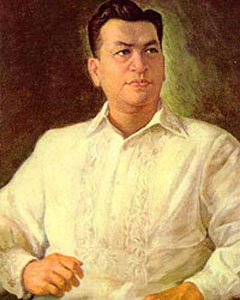Top Sports Event of the Year
by Maroonmartian
1) Wigan Athletic slaying Manchester City to win their first FA Cup
"You just can not write a better script like this"- Martin Taylor
Wigan Athletic is a relegation threatened team (they did relegated) while Machester City, with all their money and star power, looks to redeem themselves from failing to defend their title from talking the FA Cup as a consolation. Yet, the FA Cup as always favored the underdogs Wigan. You know from their incredible run to reach the Final. I was lucky to watch the Latics run as they edged Everton and Milwall. However I could not describe the feeling when they won the title courtesy of a Ben Watson goal. Just a miracle. In football your never known.
2) UAAP Football run especially UP's comeback vs FEU
Kudons to the Ateneo Blue Booters for the title, you deserve it. However, I am also quite impressed on how the Maroon Booters managed to return to the finals. We've lost (their one of my favorite team maybe the favorite of all the UP teams), two midfielders Octavio, Ayi, Eusebio and de Guzman. The contributions of goalie Custudio and defenders Roy and Serna could not also be forgotten. I expect them to reach Final 4 but not Finals. FEU is really the favorite but in the Final 4 series, Jinggoy Valmayor and the rest of the Maroons showed why they're the defending the champions. A 5-0 defeat vs FEU would have broken any teams heart but they didn't. Though they lost the Finals, they did not go down without a great fight. #UPFight
3) UP Men's Basketball make it grandslam
0-14 again. For the 3rd time. 2007, 2010, and 2013. As frequent as the national elections. At least the other basketball team of UP (Women's) is making progress. I don't know but this not really good to feel. Please next year, JUST ONE WIN. - from an alumnus who had been following you since 2004 (before his freshie year)
2) UAAP Football run especially UP's comeback vs FEU
Kudons to the Ateneo Blue Booters for the title, you deserve it. However, I am also quite impressed on how the Maroon Booters managed to return to the finals. We've lost (their one of my favorite team maybe the favorite of all the UP teams), two midfielders Octavio, Ayi, Eusebio and de Guzman. The contributions of goalie Custudio and defenders Roy and Serna could not also be forgotten. I expect them to reach Final 4 but not Finals. FEU is really the favorite but in the Final 4 series, Jinggoy Valmayor and the rest of the Maroons showed why they're the defending the champions. A 5-0 defeat vs FEU would have broken any teams heart but they didn't. Though they lost the Finals, they did not go down without a great fight. #UPFight
3) UP Men's Basketball make it grandslam
0-14 again. For the 3rd time. 2007, 2010, and 2013. As frequent as the national elections. At least the other basketball team of UP (Women's) is making progress. I don't know but this not really good to feel. Please next year, JUST ONE WIN. - from an alumnus who had been following you since 2004 (before his freshie year)
4) Smart Gilas defeats South Korea to return to FIBA World Cup
Cathartic if I might say. If you look at the past tormentors of the Philippines, it has always been Korea. I can't remember 2002 (the Racela miss) but what I remember is the breakdown in 2011 which made Jvee Casio cry. For Filipino hoops fan, this is a sort of redemption for their wait. Spain here we come. :)
5) Azkals reaching new heights
Azkals is now rank 126 in the FIFA Rankings. Schrock is doing well in Germany and we are becoming an ASEAN powerhouse. Watch out AFC Challenge Cup.
6) Liverpool Lows and the Highs
My love for this team definitely widens. Coutinho, Sturridge in. Carra retired (I felt saddened). We get flattened by some teams. The highs? Suarez in a goal binging run leading Liverpool to Champions League football and hopefully our first Premier League trophy. Tottenham, Manchester United being beaten. I just hope next year will be our year (to quote a Liverpool joke).
7) Westafalenstadion magic
The stadium and its fan is a big factor why I feel with this team. Noisy, passionate, creative (note the tifosi), and loyal. They failed to win a trophy this year but their wonderful Champions League performance from their improbable comeback against Malaga to Lewadowski magnificent performance vs Real Madrid won the hearts of many including me. Allez Dortmund! #truelove
5) Azkals reaching new heights
Azkals is now rank 126 in the FIFA Rankings. Schrock is doing well in Germany and we are becoming an ASEAN powerhouse. Watch out AFC Challenge Cup.
6) Liverpool Lows and the Highs
My love for this team definitely widens. Coutinho, Sturridge in. Carra retired (I felt saddened). We get flattened by some teams. The highs? Suarez in a goal binging run leading Liverpool to Champions League football and hopefully our first Premier League trophy. Tottenham, Manchester United being beaten. I just hope next year will be our year (to quote a Liverpool joke).
7) Westafalenstadion magic
The stadium and its fan is a big factor why I feel with this team. Noisy, passionate, creative (note the tifosi), and loyal. They failed to win a trophy this year but their wonderful Champions League performance from their improbable comeback against Malaga to Lewadowski magnificent performance vs Real Madrid won the hearts of many including me. Allez Dortmund! #truelove
